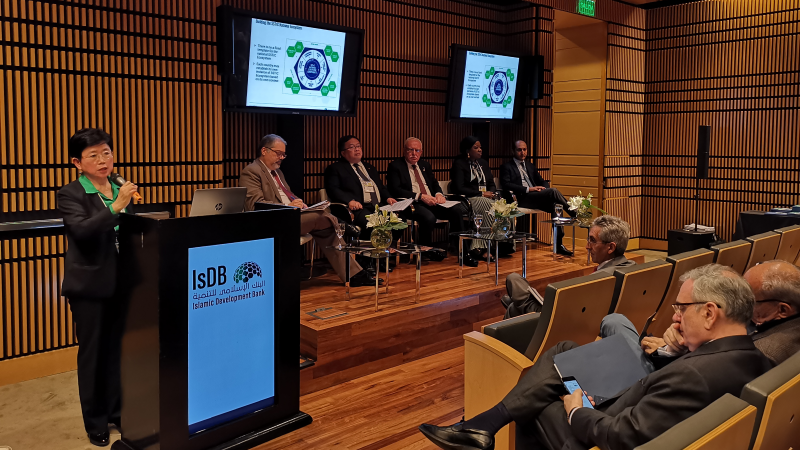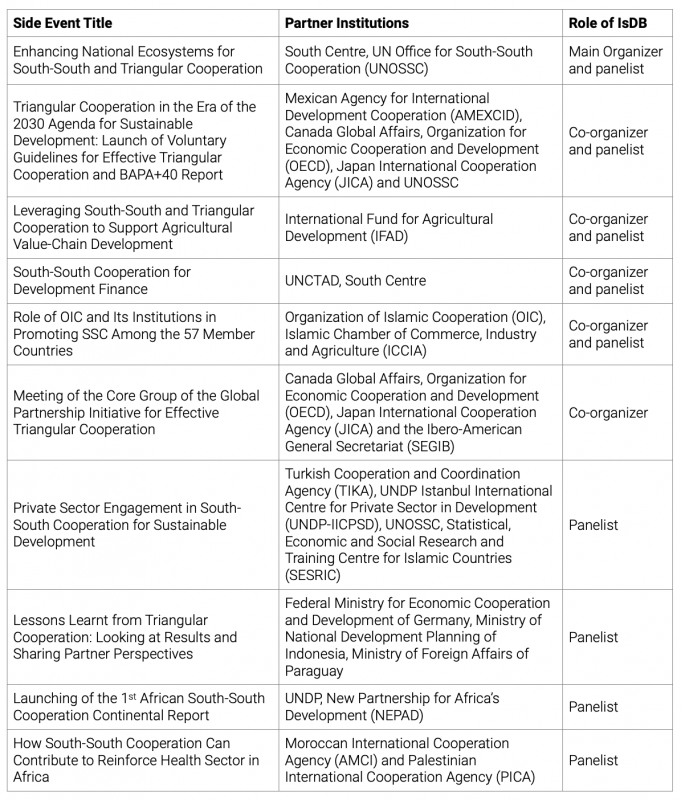The countries of the South met again in Buenos Aires, Argentina on March 20th to 22nd, 2019 in order to commemorate the 40th year of BAPA at the 2nd High-Level United Nations (UN) Conference on SSC and to take stock of achievements, challenges and opportunities in SSTrC. At the same time, the participating countries agreed on an outcome document that reinforces the long-standing principles of SSTrC as a solidarity-based development cooperation mechanism that aims to contribute to Agenda 2030.
The overall theme of the conference was “Implementation of the 2030 Agenda for Sustainable Development: Challenges and Opportunities”. The sub-themes were as follows:
- Comparative Advantages and Opportunities of South-South Cooperation;
- Challenges and the Strengthening of the Institutional Framework of South-South Cooperation and Triangular Cooperation;
- Sharing of Experiences, Best Practices and Success Stories;
- Scaling-up the Means of Implementation of the 2030 Agenda for Sustainable Development in Support of South-South Cooperation and Triangular Cooperation.
The Bank has been involved in South-South and Triangular Cooperation for decades since the launch of the Technical Cooperation Program in 1983. Naturally, with its immense experience and lessons learned in this area, the Bank actively contributed to the preparatory stages of BAPA+40 since November 2017.
The activities of the IsDB delegation at BAPA+40 included: (i) attendance in the conference during which the Outcome Document of BAPA+40 was discussed and adopted; (ii) organization of and participation in side events; (iii) participation in the BAPA+40 Exhibition; and, (iv) engagement with key partners on SSTrC.
The Conference
The conference was held for three days starting on March 20th and ending on March 22nd with the adoption of the Outcome Document. There were four plenaries consisting of an opening session, and general debates. The opening ceremony included speeches from high-ranking officials such as the President of Argentina, the Secretary-General of the UN and the Chairman of the UN General Assembly, among others.
Representatives from more than 160 UN member countries and many international development institutions, regional groupings, civil society and the private sector attended the conference. During the debates, various country representatives, including Ministers, made statements to highlight the importance of SSTrC, to highlight specific opportunities and challenges, and share ideas for strengthening SSTrC in the framework of Agenda 2030.
The key result of the conference was the adoption of the Outcome Document by the representatives of over 160 member countries of the UN. The Outcome Document was negotiated over a period of about one year, coordinated by the UNOSSC and facilitated by two negotiators from Lithuania and Uganda
The main highlights of the outcome document are as follows:
- The long-held principles of SSC—which are: (i) respect for national sovereignty; (ii) national ownership; (iii) independence; (iv) equality; (v) non-conditionality; (vi) non-interference in domestic affairs; (vii) mutual benefit—were reaffirmed during the conference;
- The complementary nature of SSC to North-South Cooperation was also highlighted. Furthermore, the role of SSC as a key mechanism to contribute to the achievement of all the SDGs under Agenda 2030 was stressed;
- The multi-dimensional nature of SSC is outlined in the Outcome Document, noting that in addition to the transfer of know-how, expertise and capacity, SSC also covers cross-border investments and trade among the countries of the Global South;
- Development institutions, particularly the multilateral development banks, are encouraged to develop more effective mechanisms for SSTrC;
- Multilateral, regional and bilateral financial and development institutions to consider increasing financial resources and technical cooperation for SSTrC;
- The importance of strong institutional arrangements for SSTrC was also highlighted in the Outcome Document, noting that some countries are more advanced than others with respect to putting in place relevant national institutional arrangements including national strategies for SSTrC, and mandating specific national agencies to undertake SSTrC. The Outcome Document called for putting in place mechanisms so that countries can share these best practices;
- Triangular Cooperation has been covered extensively in the document, noting the increased support that is being provided from traditional donors and development institutions to SSC. In this respect, the document calls for increased resources and structured approaches to strengthening Triangular Cooperation. It should be noted that the Global Partnership Initiative on Effective Triangular Cooperation, which is a partnership platform managed by the IsDB, the OECD and the development agencies of Canada, Mexico, and Japan, has been specifically mentioned in the Outcome Document as a successful platform for enhanced Triangular Cooperation;
- In outlining the importance of Triangular Cooperation as a flexible and effective approach to solving development challenges through smart partnerships, the Outcome Document also highlights the role that the private sector should play in order to “multiply the potential of development cooperation and mitigate risks when resources are limited”;
- There has also been added emphasis in several places in the Outcome Document on the need to develop measurement frameworks to assess the quality and impact of SSTrC interventions. The document highlights that such approaches should be formulated in a non-binding and voluntary way while taking into account the various approaches and experiences that already exist in the countries of the South in this regard. UN agencies and development institutions such as the IsDB are invited to support the formulation of such assessment and measurement frameworks in order to enhance the transparency and accountability of SSTrC.
Side Events
Over 90 side events were organized on the sidelines of the conference. The IsDB was involved in 10 of these events. The Bank organized one main side event focusing on “Enhancing National Ecosystems for SSTrC”. In addition, the Bank co-organized five additional side events with key partners and participated in three side events organized by other partners as panelists/speakers. The following is an outline of the events that IsDB co-organized and participated in:

